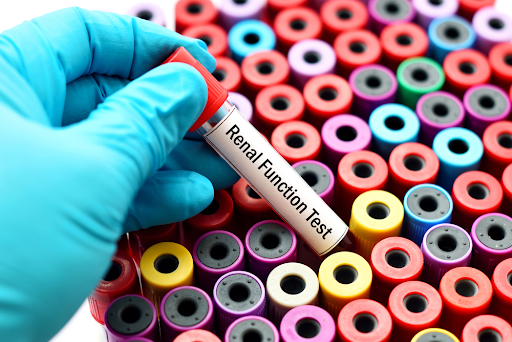What Does Renal Function Test Indicate?

When it comes to maintaining optimal health, our kidneys play a crucial role in filtering waste and excess fluids from the bloodstream. However, various factors such as lifestyle choices, genetic predisposition, and underlying medical conditions can impact their function. Renal function tests serve as essential tools in assessing the health of our kidneys and detecting potential issues early on. In this comprehensive guide, we'll delve into what renal function tests indicate, why they are important, and what parameters they measure.
Symptoms Of Kidney Problems
Symptoms of kidney problems can manifest in various ways, often
affecting multiple systems within the body. It's important to be
vigilant and recognize these signs, as early detection can lead to
prompt intervention and better outcomes.
One of the hallmark symptoms of kidney dysfunction is changes in
urination patterns. This can include increased frequency, difficulty
urinating, or the presence of blood in the urine (hematuria).
Additionally, individuals may experience swelling in the legs,
ankles, face, or abdomen due to fluid retention—a condition known as
edema.
Other common symptoms of kidney problems include persistent fatigue,
shortness of breath, nausea, vomiting, and unexplained weight loss.
In more advanced stages of kidney disease, individuals may also
develop hypertension (high blood pressure) and experience
neurological symptoms such as difficulty concentrating or numbness
in the extremities.
Recognizing these symptoms and promptly seeking medical evaluation
can aid in the
early diagnosis
and management of kidney disease.
Causes of Renal Disease
A myriad of factors can contribute to the development of renal disease, ranging from lifestyle choices to underlying medical conditions. Strategies for prevention and therapy both depend on an understanding of these causes.
Diabetes
Diabetes mellitus is a leading cause of kidney disease, particularly when blood sugar levels are poorly controlled over time. Elevated blood glucose levels can damage the small blood vessels in the kidneys, impairing their function and leading to chronic kidney disease (CKD).
Hypertension
High blood pressure can exert excessive strain on the kidneys, ultimately leading to damage to the delicate filtering units known as nephrons. Over time, this can progress to CKD and increase the risk of cardiovascular complications.
Glomerulonephritis
This term refers to inflammation of the glomeruli, the tiny structures within the kidneys responsible for filtering blood. Glomerulonephritis can be acute or chronic and may result from autoimmune disorders, infections, or exposure to toxins.
Polycystic Kidney Disease (PKD)
PKD is a genetic disorder characterized by the formation of fluid-filled cysts within the kidneys, which can interfere with their normal function over time. This condition tends to run in families and may lead to progressive kidney damage and eventual failure.
Urinary Tract Obstruction
Blockages in the urinary tract, such as kidney stones or tumors, can
impair the flow of urine and cause pressure to build up within the
kidneys. Chronic obstruction can lead to kidney damage and increase
the risk of infection.
By addressing these underlying causes and implementing appropriate
management strategies, individuals can reduce their risk of
developing renal disease and preserve kidney function.
Why Do You Need to Do a Kidney Function Test?
Regular kidney function testing is crucial for individuals at risk of renal disease or those with existing kidney-related conditions. These tests provide valuable insights into the health and function of the kidneys, allowing healthcare providers to intervene early and prevent further damage.
Early Detection
Renal function tests can detect abnormalities in kidney function before symptoms manifest, enabling early intervention and treatment. This is particularly important for individuals with risk factors such as diabetes, hypertension, or a family history of kidney disease.
Monitoring Disease Progression
For individuals diagnosed with kidney disease, regular renal function testing is essential for monitoring disease progression and assessing the effectiveness of treatment. By tracking changes in kidney function over time, healthcare providers can make informed decisions regarding medication adjustments and lifestyle modifications.
Assessment of Medication Safety
Certain medications can have adverse effects on kidney function, especially when used long-term or in high doses. Kidney function tests help healthcare providers evaluate the safety of these medications and adjust dosages accordingly to prevent further harm.
Preoperative Evaluation
Prior to undergoing surgery, individuals may undergo renal function testing to assess their kidneys' ability to tolerate anesthesia and other medications used during the procedure. This helps reduce the risk of postoperative complications, such as acute kidney injury.
Management of Chronic Conditions
Patients with chronic conditions such as diabetes or hypertension
require regular kidney function monitoring to prevent complications
associated with renal dysfunction. By maintaining optimal kidney
health, individuals can better manage their underlying conditions
and improve overall quality of life.
In summary, kidney function tests are essential tools for early
detection, monitoring disease progression, and ensuring the safety
of medical interventions. By incorporating regular renal function
testing into routine healthcare, individuals can take proactive
steps towards preserving kidney function and maintaining overall
health.
What Parameters Are Measured in Kidney Function Test (RFT)?
Renal function tests, also known as RFTs, encompass a panel of laboratory tests designed to assess various aspects of kidney function. These tests measure specific parameters in the blood and urine, providing valuable information about the kidneys' ability to filter waste products and maintain fluid balance.
Creatinine
This waste product is the result of the metabolism of muscle. Urine is the kidneys' method of filtering it out. Elevated levels may indicate kidney dysfunction.
Blood urea nitrogen (BUN)
This measures the amount of nitrogen in the blood that comes from urea, a waste product of protein metabolism. Increased levels may be a sign of liver or renal disease.
Electrolytes
This includes measurements of sodium, potassium, and chloride levels. Electrolyte balance is crucial for kidney function, and imbalances can indicate kidney dysfunction.
Glomerular Filtration Rate (GFR)
This is a measure of how well the kidneys are filtering waste from the blood. It's often estimated using the EGFR test or calculated based on creatinine levels.
Urea
This is another waste product that is filtered by the kidneys and
excreted in urine. Elevated levels can indicate kidney dysfunction.
By evaluating these key parameters, healthcare providers can obtain
a comprehensive assessment of kidney function and identify any
abnormalities that may require further evaluation or intervention.
Conclusion
In conclusion, renal function tests play a vital role in assessing the health and function of the kidneys, enabling early detection and intervention for renal disease. By recognizing the symptoms of kidney problems, understanding the underlying causes, and regularly monitoring kidney function through renal function tests, individuals can take proactive steps towards preserving kidney health and reducing the risk of complications. Incorporating these measures into routine healthcare practices can help promote optimal kidney function and overall well-being for years to come. If you're in need of a reliable provider for renal function tests, consider choosing Asto Labs. Their comprehensive testing services and commitment to accuracy make them a trusted choice for individuals seeking to monitor their kidney health effectively.





